Ubo Read online
First published 2017 by Solaris
an imprint of Rebellion Publishing Ltd,
Riverside House, Osney Mead,
Oxford, OX2 0ES, UK
www.solarisbooks.com
ISBN: 978-1-84997-926-9
Copyright © 2017 Steve Rasnic Tem
Cover art by Sam Gretton
The right of the author to be identified as the author of this work has been asserted in accordance with the Copyright, Designs and Patents Act 1988.
All rights reserved. No part of this publication may be reproduced, stored in a retrieval system, or transmitted, in any form or by any means, electronic, mechanical, photocopying, recording or otherwise, without the prior permission of the copyright owners.
This book is a work of fiction. Names. characters, places and incidents are products of the author’s imagination or are used fictitiously.
For Melanie,
Always
“Man seeks for drama and excitement; when he cannot get satisfaction on a higher level, he creates for himself the drama of destruction.”
― Erich Fromm, The Anatomy of Human Destructiveness
1
NOW IN UBO, he felt as if he’d not just fallen into but passed through the rabbit hole.
Every resident had a similar memory of the journey here: a dream of dry, chitinous wings crossing the moon, the gigantic insects so like roaches or cicadas dropping swiftly over the houses of the neighborhood, and then hooking him with a spur through the base of the thumb, yanking him out of his life for a trip into the distant stars. They all had that same impossible recollection, some sort of shared nightmare or mass hallucination. Each had passed out or had suffered some gap in memory, although many were lucky enough to have gone to bed or nodded off reading or watching television. For some there was a vague recollection that a window had been left open or forced open from the outside, or in a few cases the walls of the house or apartment had actually dissolved, providing easy access for their kidnapping.
Specifics varied. For some it was all the eyes looking at them. For who could trust eyes like that, staring at you out of the dark on the other side of the bed? You could never know what really occurred in the stream of thoughts passing uninterrupted, even in sleep, behind such eyes.
For others it was an obsession with fingernails, how at any moment those nails might turn into claws and dig into flesh. Some claimed they’d seen nails lengthen and expand, turning into a hard sheathing covering hands, arms, torsos.
Most recalled despair that they might never find their way home again.
In a few instances they had had a notion that they’d done something terrible that day, or had wanted to, or had first realized that they were capable of performing some dreadful act.
Dark membranes and scabrous exoskeleton passed through walls and windows in some manner magical or scientific like a deck of dusky and baroquely‑ornamented cards fanning themselves from one hidden world into the next. Then, spreading their wings over the bed where he curled against the love of his life, they’d separated him from his wife of ten years and yanked him out of the world.
In almost all these memories long horned lobes ascended into the broad ebony heads framed by multi‑faceted eye globes. From each side of the head protruded vicious‑looking mandibles. Their forelegs and back legs were armed with jagged protrusions, and their thick black and dull‑gray hides were spotted with barbs.
There was also the smell which wasn’t quite a smell, and the sense of a scummy dark effusion that made you want to avoid contact at all cost.
Some of the residents claimed to have been awake during the final stage of the journey. They said the name Ubo came from an aerial view of the ruined complex that made up this experimental hell which shaped the letters U, B, and O. Daniel had no memory of this, no memory of waking up at all during the long journey, and yet he too had known the name immediately upon awakening. Strange as the story seemed, it had always rung true.
They all wore skin-tight uniforms the color of snail skin, with a dark mottled pattern over the shoulders and back. Daniel thought they looked like animals preparing to shed their hides. They gathered in small groups to wait and pass the time. These groups tended to go everywhere together, eating together, sleeping in close proximity like tribes. And each tribe seemed to have its own particular conversational obsessions.
It was the stench of the place that originally convinced Daniel that Ubo was no dream, even though “dreamlike” was an impression he was never quite able to shed. But no dream could have been that extended or detailed, that vivid. And in the early months of shock and confusion after his arrival, those inescapable smells upon awakening reminded him where he was.
He’d been there long enough that familiarity had lessened the effect of those terrible smells, but they could not be ignored. Picking out individual olfactory sources was a futile game, but one his tribe played from time to time.
“A slaughterhouse, I think,” was John’s assessment. John was huge and bearded, an unusually dramatic presence in their relatively small community. “I visited one in Berlin in my youth. You never forget the lingering smell of blood as it turns, and this underlying rot because the facility could never be completely cleaned. The animals,too, when they became frightened, gave off this peculiar smell. Ammonia, I believe. People do as well, of course, when they know they’re about to die. They piss themselves.” He laughed loudly. Daniel always thought of him as their Falstaff: larger than life, a drunken and deranged Santa Claus type, as played by Orson Welles. But with something worn and tired deep behind the twinkle in the eye. What was the line? “We have heard the chimes at Midnight.” Henry the Fourth Part Two. Whatever Shakespeare had meant by that, Daniel was sure it had happened to all of them.
“P—please, we just a—ate,” Bogart said muddily. His real name was Alan, but assigning alternate names to each member of his small group had become a habit of Daniel’s. But it was also self-protection; it took the sting out when they disappeared, which they all did eventually—either they wouldn’t come back from a scenario or they wouldn’t be there when he woke up in the morning. There was no particular logic behind the name assignments—a vague resemblance, perhaps, or the result of some anecdote. Daniel didn’t know these men well enough to suggest they were anything like their namesakes. But there was a power in naming, even if you didn’t know your secret name. Somehow over time the names began to fit in odd ways, as if he had sensed something about them he couldn’t have put into words. Bogart had turned out to be as secretive as a gangster, and wouldn’t tell Daniel his real name when they’d first met. “I’d r—rather not say. The guards...” He shifted his dark eyes. “They m—might hear.”
Charles, their red-headed comrade with the little beard, became Lenin in Daniel’s mind. Lenin thought Bogart might be an infamous criminal, perhaps even famous enough they’d be asked to play him at some point. Daniel just figured that Bogart was afraid if the roaches knew his name they’d have more power over him. Daniel was pretty sure the roaches already knew everybody’s name. They knew everything else.
“You should know where your food comes from, my friend. It shows respect for the animal,” Falstaff said.
Lenin made a disgusted noise. “Do you really think that pink protein paste they feed us came from any living thing? From some chemist’s vat, most likely.”
“Sewer smells, what else could it be?” Walter said. Daniel had assigned Gandhi as Walter’s new name. The resemblance was approximate—Daniel doubted that Gandhi had ever been this thin. “Piss and shit, obviously. Don’t tell me that after all we’ve been through you’re too shy to say the words!” Gandhi stretched out his neck and gestured broadly with his arms in emphasis. Daniel noticed the scars running lengthwise on his wrists, spreading up his nec
k from his chest like flesh-colored vines.
Falstaff laughed. “You’d think with all these scientists in charge, the roaches could build a better sewer.” That the roaches were scientists, that they were studying the residents for violent tendencies and dynamics, was their agreed-upon theory. It made perfect sense, given the scenarios they were each forced to act in. Most importantly, it provided a semblance of an answer to the question of why they had all been brought here.
The other men did look uncomfortable, with Lenin glancing at the brown smears on the walls. “That’s just paint, I think,” Daniel said. “These random, foul-looking streaks about, the spots on the floor, I think it’s deliberate. They want us to feel like we’re in a degrading environment. It might even be a separate study all its own.
“Come to think of it, the roaches probably pump in an artificial stink. They want to make things seem as awful as possible—it heightens the scenarios. And maybe they think it’ll bring out our own violent tendencies. A few weeks back I played a guard in the Khmer Rouge. We forced the prisoners to eat our feces, but then we had to smell it on their breath when we tortured them. When theybrought me back here I could still smell it, taste it in the back of my throat. So bad.”
It bothered Daniel that he knew trivia like this, that Stalin had hated kitchen smells, which is why he always kept his living and working quarters far removed from the sources of his meals. Playing the parts of murderers could be quite educational.
“I remember that scenario,” Gandhi interrupted. “I smelled it. I smelled it,too.”
“Exactly,” Daniel said. “The roaches are manufacturing the smell and pumping it in.” It sounded ridiculous even as he said the words, but it was a modestly entertaining theory. Which he didn’t believe. Whatever the source, he was sure this was what Hell smelled like.
“They’re n-not roaches,” Bogart mumbled. “Well, of c—course they’re n—not, but I mean they don’t a—actually resemble roaches, that’s j—just what we all c—call them. They resemble c—cicadas, gigantic cicadas.”
“Ki...ki..what?” Falstaff said.
“C—cicada,” Bogart said. “They make that loud s—song on hot s—summer nights, especially in the South. S—sometimes the locals c—call them locusts, but they’re not t—true locusts.
“Who cares?” Falstaff said.
“Everything m—matters here,” Bogart sounded less and less like Humphrey Bogart the more passionate he became. “Every d—detail has some m—meaning, if we can just f—figure it out. These are relatively b—broad creatures with their w—wide and triangular oversized h—heads. A roach’s h—head would be m—much smaller. And the b—bodies? No c—comparison, the cicada’s being relatively b-bulbous like these, and see the w-way they come to a k—kind of point at the end?”
“Like the ass on a large bee,” Lenin said. Falstaff snorted.
“Yes, b—but again, they’re not really c—cicadas either. The o—ones observing us, the scientists...”
“They look ridiculous in their lab coats.” Gandhi spat. “They don’t even fit.”
“No, they d—don’t. I s—suspect the c—coats are for our benefit, or rather, r—reference. The scientists have those h—huge multifaceted eyes...”
“You can see your face in each one. I hate that! The guards’ eyes are smaller,” Falstaff said, “but they’ve got those huge mouth parts, and swollen forelegs with the serrated edges. I’ve heard they’ve taken off a man’s head with those, two or three, although I’ve never seen it personally. You don’t dare tangle with one of those—you won’t survive it.”
Bogart wrinkled his mouth. “I’ve also h—heard that for p—punishment they can wrap one of those f—forelimb c—claws around your thumb and r—rip it right out of your h—hand, that several c—captives were punished that w—way on their initial t—trip to Ubo. Supposedly there are a n—number of m—men here missing t—thumbs, but I’ve never s—seen one.”
Gandhi waved a thin, fragile-looking hand. “It’s just another story they tell you when you first get here. An old man told me the thumb would grow back eventually so the roaches could torture you all over again. They’re just stories they tell to scare the new arrivals, that’s all.”
Lenin interrupted. “But can we agree to continue to call them roaches? Because that’s the word in our heads, and the other’s too, well, odd.”
The others readily agreed, then fell into silence, waiting. For this was the waiting room. Although the men sometimes referred to it as the commons area, it was really just this big room in the middle of everything where they waited for their next dramatic assignment.
Daniel stood up and walked around. There were few opportunities for exercise here. Although in his next scenario he might be running around creating mayhem, he’d actually be lying on a platform back in the labs, the roaches swarming all over him as if he were an accidentally-dropped morsel of food, taking readings and—he didn’t actually know what all they did, simply that it felt unpleasant afterwards.
The five of them always sat in a circle facing each other in the waiting room. It narrowed their focus, and the grouping provided them with a sense of security. And after six months or more of virtual catatonia following his initial arrival, Daniel had them to thank for leading him out of it.
The room itself was enormous-more than a hundred feet in length, half as wide—and a ruin. It looked to have been a factory originally. Much of the floor space was open, but the concrete and tile floor was pitted every few feet with small impact craters. Daniel remembered photographs of Sarajevo after the siege. The ceiling was missing large sections, with bare wiring and insulation hanging down, some of it melted into ghostly screens of translucent plastic stalactite. Although a great deal of the debris had been swept up, there were still large regions chained off, gaping holes in the floor surrounded by layers of plaster, rotted trim, blast fragments, burnt mechanical parts, and melted masses of the unidentifiable. Whenever residents felt inspired to clean up those areas they were warned away by a rapid deployment of the giant roaches brandishing their serrated and swollen appendages.
Even the so-called clean areas were marred with scorch and rust, dark friction trails, crash scars, and black fields of mold. He’d seen similar footage of abandoned industrial structures in Detroit.
Other groups of residents were scattered around the room, huddled together, backs turned like Daniel’s own group, or occasionally barricaded behind crumbling concrete and steel pillars and overturned furniture. They glanced warily at him and the other groups. Territorial squabbles and accusatory outbursts were common, although during his time here Daniel had never seen any actual combat. The roaches would have quickly intervened, and no one wanted that. Even though he’d been here for a relatively long time (although apparently nothing matching Falstaff’s stint), the visceral reaction he experienced in their presence was debilitating. It made you want to peel off your skin.
The wide archway at one end of the room led to the bunkrooms and cafeteria, and presumably other barracks and other populations of residents beyond. It was rumored there was a small section for women only, but Daniel had his doubts. He certainly hadn’t seen any women since he’d been here. Falstaff’s explanation had been simple, “Women don’t kill nearly as many people, so the roaches aren’t as interested.” The vast majority of the residents were men in their late twenties, with a few middle-aged, and a select few much older. Two or three appeared to be in their late teens, with no one under eighteen as far as he could tell.
Wherever anger and irrationality were factors, he imagined males any younger would skew the results. Bad enough they had so many in their twenties—those he tended to avoid. Perhaps it wasn’t fair, but he’d always assumed the residents had been chosen for a reason. As to why they’d chosen him personally he had no idea.
Several roaches—the mammoth, guard variety—milled about in the area beyond the arch, dragging their oversized appendages on the floor, spinning around now and then like d
ogs chasing their tails. Their mere presence kept the residents from wandering too far.
At the opposite end of the room was a long wide slot of a window at about chest height. Numerous roach heads were visible peering in from the other side. These creatures were of the smaller variety, who walked around upright and wore the lab coats—no more than tattered capes really, of some thin shimmering material. Because these were the ones seen just before each scenario began, they’d been labeled “scientists” or “doctors” by the residents.
Of course there was no way of knowing whether any of these suppositions were true. Falstaff, however, was definite. “Trust me. I’ve been here a long time. The way they stare at us, I think they’ve probably got us all pretty well figured out by now. They’re the ones in charge.”
Daniel had noticed that at certain angles the heads of the roaches shimmered with a flickering striation effect. It occurred to him that they might be wearing some sort of protective suit, without which they would be unable to breathe. It was a constant tug on his attention. It suggested an alien environment. Where exactly was Ubo?
Daniel wandered over to the bank of windows which provided the sole view from the waiting room of “outside.” He did it for the direct sunlight, not because he particularly enjoyed the view. Many of the residents appeared to avoid it after the first few visits.
One of the surprises he’d gotten the first time he’d gazed out these windows was the understanding that they were more than twenty stories up in the air. Each reminder of this fact disoriented him. The facility had always felt like a dim, buried, underground sort of place. To look out a window and see a vista felt somehow contradictory here.
Even if that vista had largely been destroyed. It was obvious that a significant portion of the sprawling structure they were in had collapsed. The ground below them contained shattered walls and support beams several levels deep. An avalanche of dozens of floors of staircase sections had made a convoluted mass of steps that led nowhere. The building that remained looked as if a gigantic bite had been taken out of it and the mouth’s contents spat out below.

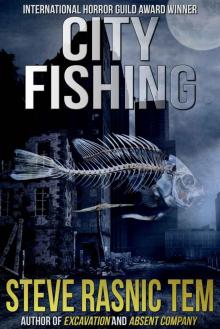 City Fishing
City Fishing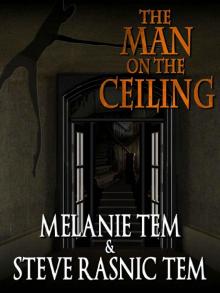 The Man on the Ceiling
The Man on the Ceiling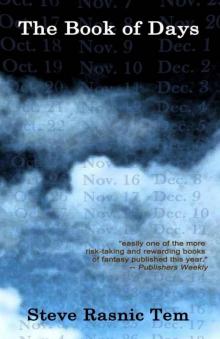 The Book of Days
The Book of Days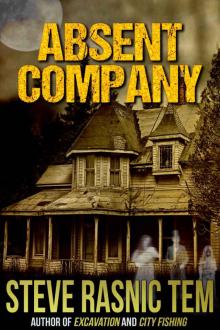 Absent Company
Absent Company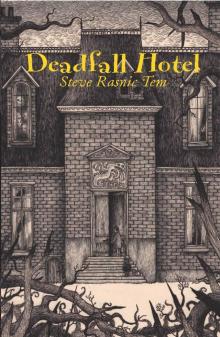 Deadfall Hotel
Deadfall Hotel Celestial Inventories
Celestial Inventories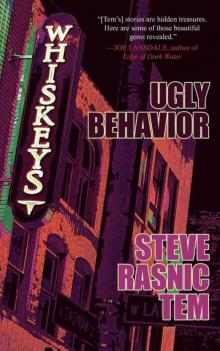 Ugly Behavior
Ugly Behavior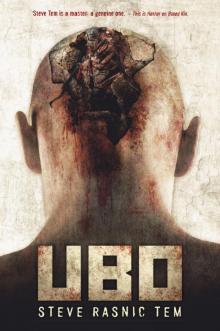 Ubo
Ubo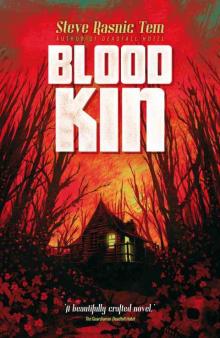 Blood Kin
Blood Kin